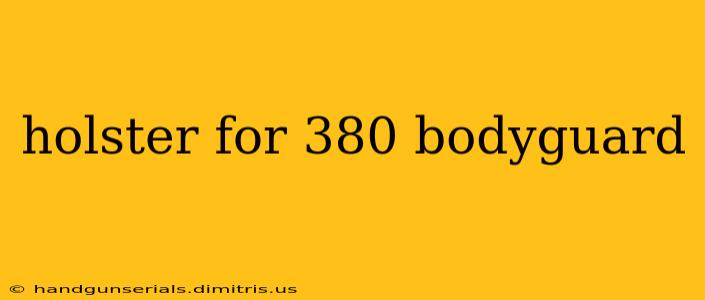Choosing the right holster for your 380 Bodyguard is crucial for safety, comfort, and ease of access. This isn't just about finding a holster; it's about finding the holster that perfectly suits your lifestyle, carry preferences, and the specific needs of your firearm. This guide will delve into the key factors to consider when selecting a holster for your 380 Bodyguard, helping you make an informed decision.
Understanding Your Needs: Carry Style and Lifestyle
Before diving into holster types, consider your carry style and daily activities. This will significantly impact your holster choice. Common carry methods include:
- Inside the Waistband (IWB): Concealed carry, offering excellent concealment, but requires proper training and practice for safe and comfortable drawing.
- Outside the Waistband (OWB): Open carry, easier to access but less discreet. Often preferred for range use or open-carry states.
- Pocket Carry: Convenient for everyday carry, but can be less secure and may require specific pocket holsters.
- Ankle Carry: Concealed carry, ideal for those seeking ultimate concealment but with slower draw times.
- Shoulder Holsters: Useful for comfortable concealed carry, especially with larger firearms, but may be less practical for everyday wear.
Key Features to Look for in a 380 Bodyguard Holster
Once you’ve determined your preferred carry method, focus on these essential features:
1. Retention: Securing Your Firearm
The holster's retention mechanism is paramount. You want a holster that securely holds your 380 Bodyguard, preventing accidental discharge or loss, yet allows for a smooth, quick draw. Common retention methods include:
- Friction Retention: Relies on friction between the holster and the firearm. Simplest, but less secure than other methods.
- Snap Retention: Features a snap or button for added security.
- Paddle Holsters: These often use a combination of friction and a secure paddle for easy attachment and removal.
- Level II Retention: For increased security, a level II retention system might include a thumb break or other locking mechanism. This would be ideal for a duty weapon, but not essential for everyday concealed carry of a 380 Bodyguard.
2. Material: Durability and Comfort
The holster's material significantly impacts its durability and comfort. Popular choices include:
- Kydex: Durable, lightweight, and resistant to wear and tear. Offers excellent retention.
- Leather: Classic choice, comfortable against the skin, but may require more break-in time. Offers good retention.
- Nylon: Affordable and lightweight, but may not offer the same level of retention as Kydex or leather.
3. Fit and Finish: Precision and Comfort
A well-made holster will fit your 380 Bodyguard precisely, preventing shifting or movement during carry. Look for holsters with smooth edges and a comfortable design to minimize chafing or discomfort.
4. Concealability: Discreet Carry
If concealed carry is your priority, consider the holster's profile and how it sits against your body. A slim-profile holster will enhance concealment.
Choosing the Right Holster for Your Lifestyle
-
Everyday Carry (EDC): An IWB holster with a good retention system (like a snap) is usually ideal for EDC. Kydex or leather are both good choices for material. Look for comfort and a low profile.
-
Range Use: An OWB holster, often with a paddle or belt loops, provides quick and easy access to your firearm. Durability is a key consideration for range use.
-
Concealed Carry (CCW): Similar to EDC, IWB or even a well-designed pocket holster might be your best option. Prioritize concealment and secure retention.
Conclusion: Prioritize Safety and Comfort
Selecting the right holster for your 380 Bodyguard is a personal decision. Prioritize safety, comfort, and the appropriate carry method for your lifestyle. Consider the factors outlined in this guide and choose a holster that meets your specific needs. Remember to always practice safe gun handling and seek professional training for proper holster use and firearm handling techniques.

